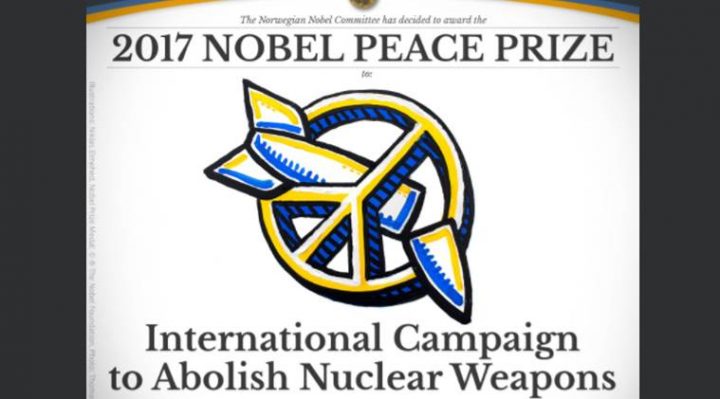Jan Oberg
Our thanks to the Nobel Peace Prize Committee for awarding its 2017 Prize to ICAN – the International Campaign to Abolish Nuclear Weapons.
Undoubtedly nuclear disarmament and, ultimately, nuclear abolition is a major – if not the major – goal of humankind. There can be no lasting peace with these weapons and there exists no goal the achievement of which would legitimate the use of this type of weapons.
Even when not used, nuclear weapons cause problems, distrust, risks and pretext for wars – think Russia-NATO, Iraq, the nuclear deal (JCPOA) with Iran, US-North Korea, Israel, India-Pakistan – and documented technical malfunctions, human failures, and accidents with nuclear weapons.
Secondly, this year’s award honours the UN Charter, Article 1 of which states the essentially important norm that peace shall be brought about by peaceful means.
It is also in clear support – as was emphasized by the Committee’s chairwoman, Berit Reiss-Andersen, herself a lawyer – of the NPT of 1970, the Non-Proliferation Treaty. The NPT states the longterm goal of general and complete disarmament, that the countries who possess nuclear weapons shall, in good faith, negotiate them away as a quid pro quo for others who may want to acquire nuclear weapons abstain from doing so. That is, possession is as important to abolish and a key to secure non-proliferation. Regrettably, all those who possess nuclear weapons have done the opposite of negotiating them away.
Thus, this year’s prize is a very important support for international law and the UN – our basic common normative system and foundations of international law that has been ignored (also by the media) and violated time and again during the last 20-30 years.
Third, it is of tremendous importance that this year’s award goes to a civil society organisation and not to a government representative. World peace is a massive citizens’ desire anywhere, whereas governments (with few exceptions) conduct such policies that trample upon this desire.
Fourth – and no less important than the above, this year’s Award honours the essential criteria of Alfred Nobel’s will. Importantly, this was emphasized by Reiss-Andersen. Given some of the recent awardees non/anti-peace work, there is a reason to congratulate not only ICAN but also the Committee for getting it absolutely right this year.
May it be the beginning of a new drive on the road toward peace with no more accidents in the ditch.
Those of us who, since 2007, have been engaged in a public information campaign about the Committee’s non-adherence, in a number of cases, to Alfred Nobel’s will, feel good today.
The Nobel Committee calls it “the world’s most prestigious prize” and it is essential that it be awarded only to people whose work falls clearly within the criteria of the will. It is neither a human rights, humanitarian, women’s or general do-good prize. It’s for everything that has to do with reducing warfare, risks of it, militarism. It is for disarmament, reduction of forces, negotiated solutions to conflicts, peace conferences and international sister- and brotherhood.
Most media do not seem to know that – also not that lots of nominations this year too were totally irrelevant no matter their other, non-peace qualities.
Finally, it is hardly unreasonable to view this year’s choice is a mild kick to the countries who have worked against the BAN Treaty that ICAN’s work has helped so efficiently to bring about – NATO in particular.
All NATO countries have ignored the BAN Treaty (as has the other nuclear countries Russia, China, India, Pakistan, North Korea and Israel). This only goes to show how important the BAN Treaty is.
But the US is known to have put pressure on NATO members and others such as Sweden with direct threats to them should they sign the BAN Treaty (NATO countries’ mainstream media haven’t told you much about that whereas they fill you with so far non-documented rumours of Russian interference in other countries).
It’s high time to encourage, as the Nobel Committee chair emphasized, all those who possess (or store) nuclear weapons to change their policies and join humanity. They have no right and have never been given a mandate to possess these weapons and thereby threaten, potentially, the survival of humanity.
It’s all a matter of political will and moral courage. None of them base their possession of nuclear weapons on laws. The NATO Treaty doesn’t mention them at all.
The nomination of ICAN can be seen on the Nobel Peace Prize Watch here.






